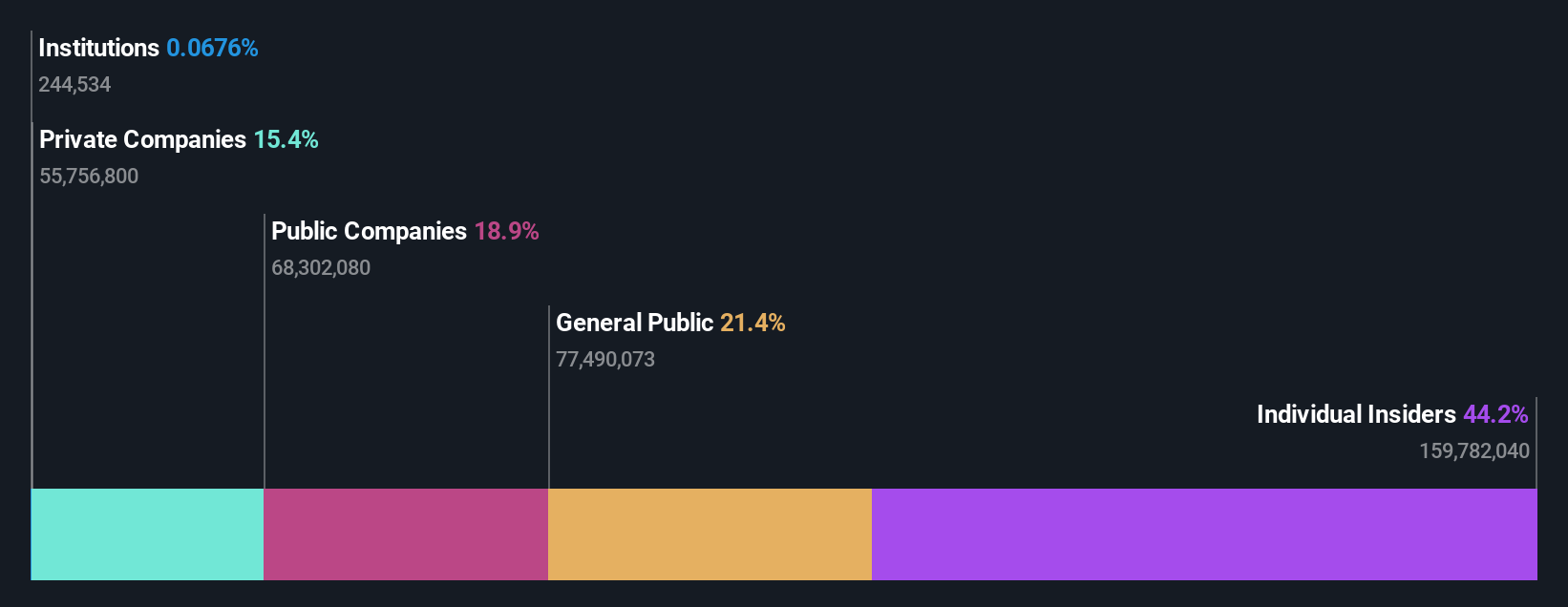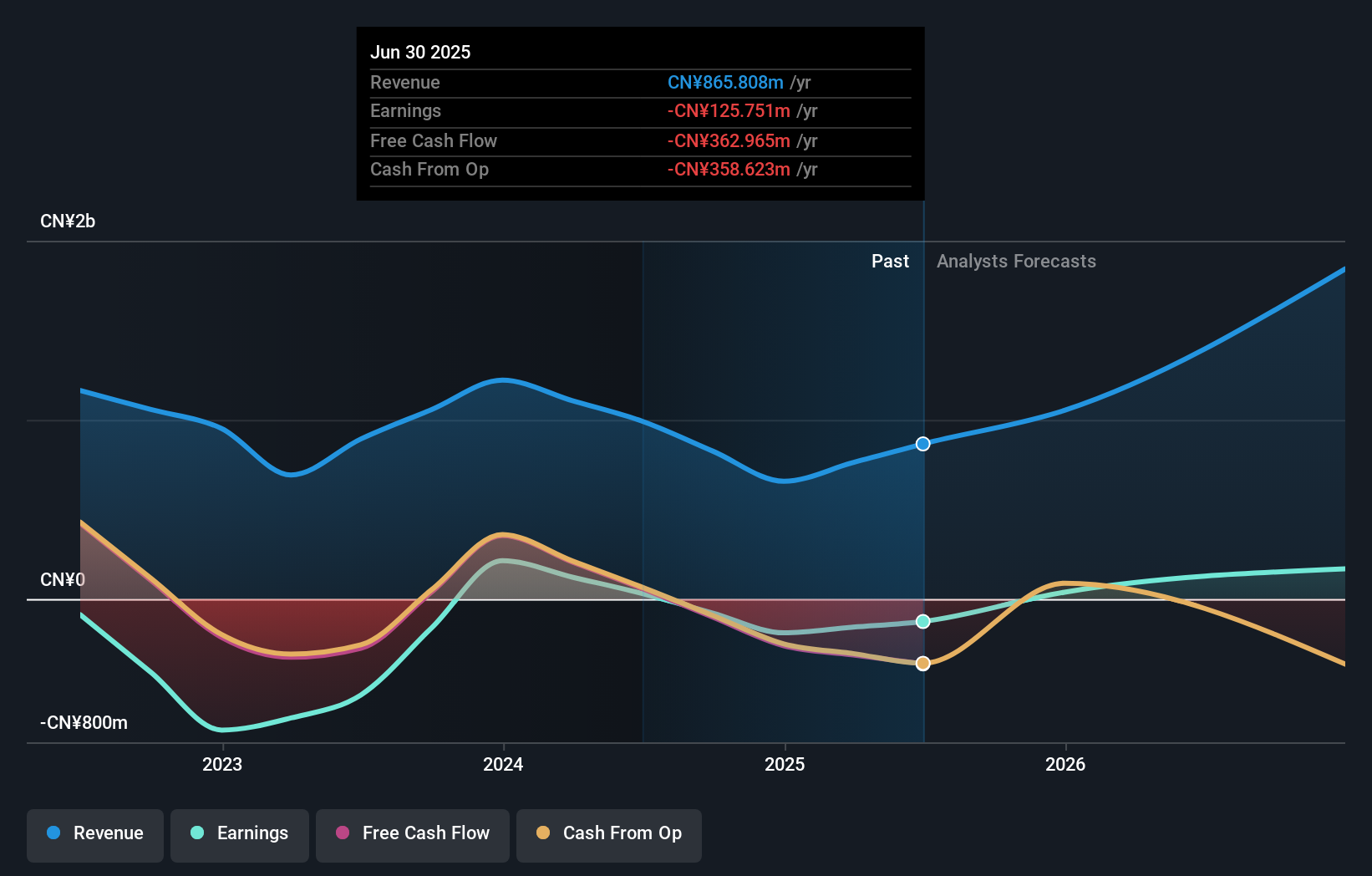- Hong Kong
- /
- Entertainment
- /
- SEHK:9857
Linmon Media Limited (HKG:9857) President Xiao Su, the company's largest shareholder sees 11%reduction in holdings value
Key Insights
- Significant insider control over Linmon Media implies vested interests in company growth
- The top 3 shareholders own 54% of the company
- Using data from company's past performance alongside ownership research, one can better assess the future performance of a company
If you want to know who really controls Linmon Media Limited (HKG:9857), then you'll have to look at the makeup of its share registry. We can see that individual insiders own the lion's share in the company with 44% ownership. Put another way, the group faces the maximum upside potential (or downside risk).
As market cap fell to HK$1.4b last week, insiders would have faced the highest losses than any other shareholder groups of the company.
In the chart below, we zoom in on the different ownership groups of Linmon Media.
View our latest analysis for Linmon Media

What Does The Lack Of Institutional Ownership Tell Us About Linmon Media?
We don't tend to see institutional investors holding stock of companies that are very risky, thinly traded, or very small. Though we do sometimes see large companies without institutions on the register, it's not particularly common.
There could be various reasons why no institutions own shares in a company. Typically, small, newly listed companies don't attract much attention from fund managers, because it would not be possible for large fund managers to build a meaningful position in the company. On the other hand, it's always possible that professional investors are avoiding a company because they don't think it's the best place for their money. Institutional investors may not find the historic growth of the business impressive, or there might be other factors at play. You can see the past revenue performance of Linmon Media, for yourself, below.

Hedge funds don't have many shares in Linmon Media. Because actions speak louder than words, we consider it a good sign when insiders own a significant stake in a company. In Linmon Media's case, its President, Xiao Su, is the largest shareholder, holding 20% of shares outstanding. Tencent Holdings Limited is the second largest shareholder owning 19% of common stock, and Hongyi Hongxin (Shenzhen) Equity Investment Fund Partnership (Limited Partnership) holds about 15% of the company stock. In addition, we found that Fei Chen, the CEO has 9.1% of the shares allocated to their name.
To make our study more interesting, we found that the top 3 shareholders have a majority ownership in the company, meaning that they are powerful enough to influence the decisions of the company.
While it makes sense to study institutional ownership data for a company, it also makes sense to study analyst sentiments to know which way the wind is blowing. While there is some analyst coverage, the company is probably not widely covered. So it could gain more attention, down the track.
Insider Ownership Of Linmon Media
While the precise definition of an insider can be subjective, almost everyone considers board members to be insiders. Management ultimately answers to the board. However, it is not uncommon for managers to be executive board members, especially if they are a founder or the CEO.
Insider ownership is positive when it signals leadership are thinking like the true owners of the company. However, high insider ownership can also give immense power to a small group within the company. This can be negative in some circumstances.
It seems insiders own a significant proportion of Linmon Media Limited. Insiders have a HK$641m stake in this HK$1.4b business. It is great to see insiders so invested in the business. It might be worth checking if those insiders have been buying recently.
General Public Ownership
With a 21% ownership, the general public, mostly comprising of individual investors, have some degree of sway over Linmon Media. While this group can't necessarily call the shots, it can certainly have a real influence on how the company is run.
Private Company Ownership
We can see that Private Companies own 15%, of the shares on issue. It's hard to draw any conclusions from this fact alone, so its worth looking into who owns those private companies. Sometimes insiders or other related parties have an interest in shares in a public company through a separate private company.
Public Company Ownership
Public companies currently own 19% of Linmon Media stock. We can't be certain but it is quite possible this is a strategic stake. The businesses may be similar, or work together.
Next Steps:
It's always worth thinking about the different groups who own shares in a company. But to understand Linmon Media better, we need to consider many other factors. Be aware that Linmon Media is showing 1 warning sign in our investment analysis , you should know about...
But ultimately it is the future, not the past, that will determine how well the owners of this business will do. Therefore we think it advisable to take a look at this free report showing whether analysts are predicting a brighter future.
NB: Figures in this article are calculated using data from the last twelve months, which refer to the 12-month period ending on the last date of the month the financial statement is dated. This may not be consistent with full year annual report figures.
New: AI Stock Screener & Alerts
Our new AI Stock Screener scans the market every day to uncover opportunities.
• Dividend Powerhouses (3%+ Yield)
• Undervalued Small Caps with Insider Buying
• High growth Tech and AI Companies
Or build your own from over 50 metrics.
Have feedback on this article? Concerned about the content? Get in touch with us directly. Alternatively, email editorial-team (at) simplywallst.com.
This article by Simply Wall St is general in nature. We provide commentary based on historical data and analyst forecasts only using an unbiased methodology and our articles are not intended to be financial advice. It does not constitute a recommendation to buy or sell any stock, and does not take account of your objectives, or your financial situation. We aim to bring you long-term focused analysis driven by fundamental data. Note that our analysis may not factor in the latest price-sensitive company announcements or qualitative material. Simply Wall St has no position in any stocks mentioned.
About SEHK:9857
Linmon Media
An investment holding company, engages in the production, distribution, and licensing of broadcasting rights of drama series in Mainland China and internationally.
Flawless balance sheet with high growth potential.
Market Insights
Community Narratives





